All our eco-responsible actions
TO READ OUR SUSTAINABLE DEVELOPMENT POLICY, CLICK HERE
INTRODUCTION
Sustainable development has been at the heart of WE LOVE GREEN since its creation. In fact, it is the very purpose of our association, which was set up in 2011: “to develop and promote eco-citizenship and raise awareness of sustainable development through the design, production and organisation of artistic events in the field of live performance”.
WE LOVE GREEN is a laboratory for experimenting with and developing eco-responsible solutions, innovations and working methods for the events and live performance sectors.
WE LOVE GREEN also aims to raise public awareness of the challenges of sustainable development, in an original context designed to arouse curiosity by enriching the festival’s musical programme with committed content, encounters and new channels of expression.
This is a collective effort. All the festival’s teams and departments are involved: management, programming, communications, partnerships, administration, production and, of course, sustainable development.
Preserving and pooling resources, turning waste into new wealth, repairing, transforming – in short, changing habits, starting with our own: saying and doing WE LOVE GREEN is the beginning of our commitment.
Our approach has been certified ISO 20121 (the international standard for “responsible management systems applied to events”) for our last edition in June 2023.
After 3 years of work by all the teams on this certification, the independent body Bureau Veritas came to audit our processes in our offices at the beginning of January 2023, then on site during the festival, with interviews of various stakeholders. And we’re delighted to have been awarded the certificate!
It’s tangible, concrete proof of the daily commitments and actions we’ve been taking for over 10 years. Above all, it encourages us to go further and gives us the framework to do so in a structured, coherent and legible way.
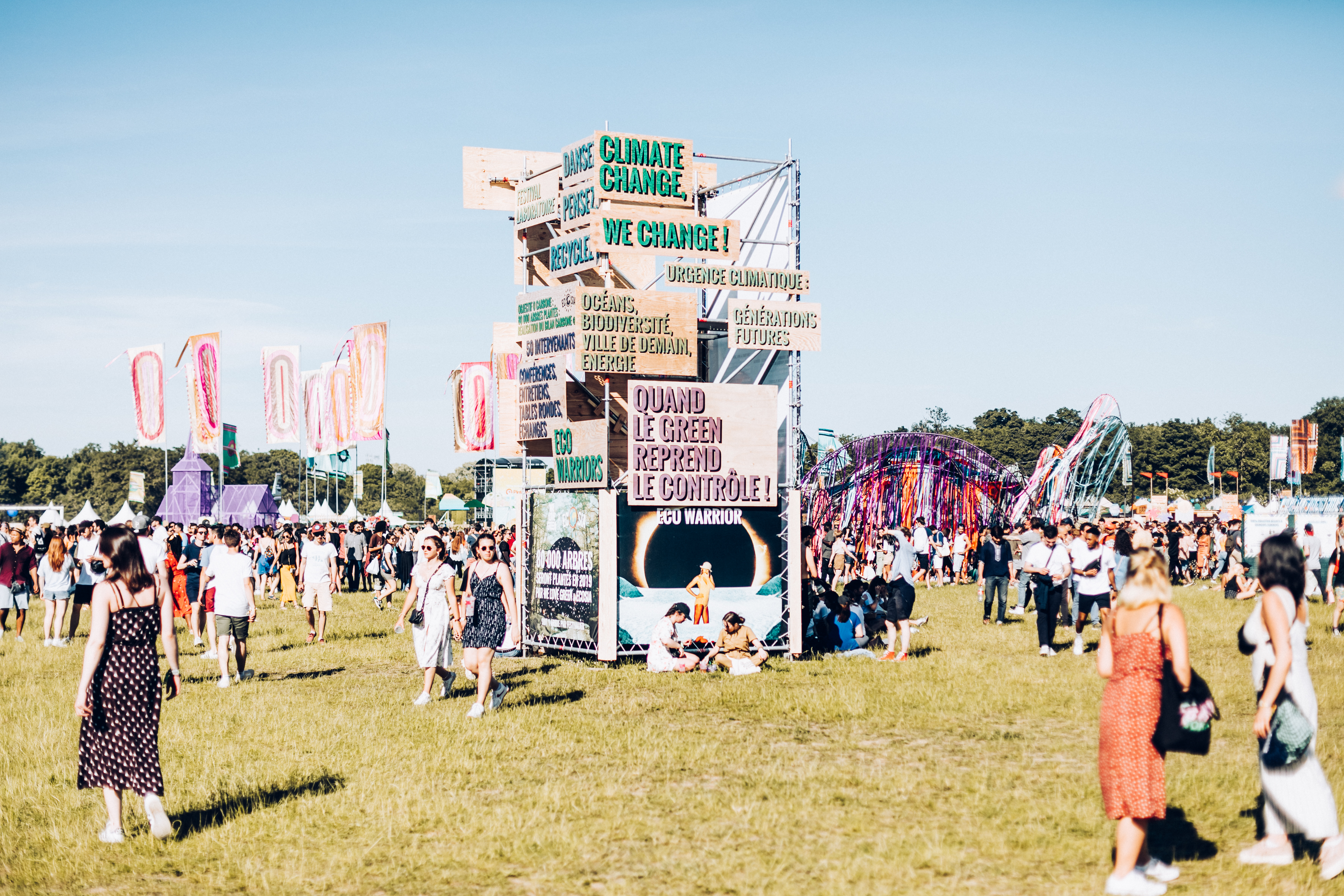
PROTECTING BIODIVERSITY
WE LOVE GREEN takes place on sports fields in the heart of the Bois de Vincennes. We do our utmost to preserve the flora and fauna that live there:
- No use of motorised vehicles on the lawns
- Installation of light decking around the site for all technical traffic
- No use of chemicals, detonations or pyrotechnics
- Installation of fencing all around the access paths and the festival to protect the wooded and vegetated areas from passageways
- A ban on detonations and pyrotechnic effects during the shows
Since 2023, WE LOVE GREEN has included in its artistic contracts noise limits lower than those imposed by the sound decree of 2017 (98 dB(A) instead of 102 dB(A)). All the festival’s technical teams are committed to ensuring that the artists’ sound engineers comply with these limits.
While the impact of outdoor events in terms of greenhouse gas emissions has already been extensively studied and worked on with the carbon footprint, the impact on biodiversity is a subject that has been little studied to date, and is more difficult to tackle in the absence of a methodology. With the help of specialised players, WE LOVE GREEN has been conducting studies for the last 2 years to provide objective information on this impact, establish study methodologies and work on protection and reduction measures:
- First small study of the festival’s impact on the avifauna of the Bois de Vincennes in 2022 carried out by the Ligue pour la Protection des Oiseaux (LPO – League for the Protection of Birds).
- From the end of 2023, launch of a study of the festival’s impact on local biodiversity (fauna, flora, soil) with the support of Ekodev, Nabi Ecology, and protocols shared with the Muséum National d’Histoire Naturelle.
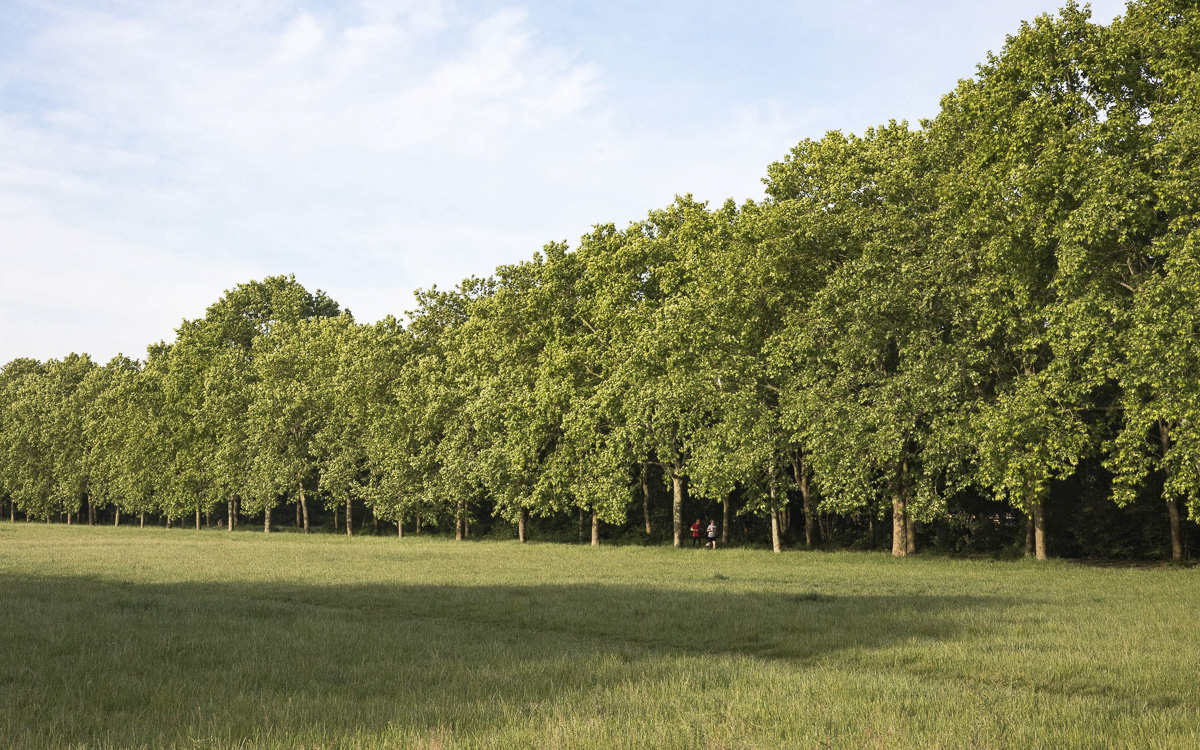
CIRCULAR ECONOMY APPROACH
Since the festival’s inception, WE LOVE GREEN has been working towards circularity, reducing the production of waste, reusing what already exists as much as possible and reclaiming everything that cannot be avoided or reused as it is. In 2019, WE LOVE GREEN has also signed up to the Green Deal Circular Festivals, an initiative of the Dutch government which now brings together 43 European festivals around a commitment: to become 100% circular by 2025.
REDUCE
- Signatory of the Drastic On Plastic charter: zero single-use plastic in all areas of the festival.
- Reusable cups since the creation of the festival in 2011
- Returnable bottles with Eau de Paris: 4,500 bottles on loan to festival-goers. Bottles returned are redistributed to outreach associations in the Paris region.
- Distribution of water bottles to technicians, artists and speakers
- Solid crockery for staff and artist meals (nearly 10,000 in 2023).
- Reusable returnable crockery on the food court: in 2023, 9 participating restaurants and 10,600 dishes involved, a first step towards wider deployment for the 2024 event.
- Donations of unsold food to outreach associations, in partnership with Linkee: in 2023, 3,000 meals were saved.
REUSE
- The scenography is reused and reworked from one edition to the next, using recycled materials from a network of some thirty economic players and associations. What is not reused is given back to social economy organisations for other uses (e.g. Emmaüs Défi in 2023).
- Most of the equipment and materials are hired, as are the crockery and cups, which are hired neutrally (without personalisation).
UPGRADE
- Sorting of 14 different waste streams (from food biowaste to edible oils, cigarette butts to litter and urine) for specific treatment by specialist service providers. Of the 137 tonnes of waste produced in 2023, 105 tonnes were recycled.
- Waste management provided by teams from Aremacs, a leading association in the events sector. Aremacs heads up the festival’s Green Brigade, welcoming 140 volunteers over the 3 days of operations.
ENERGY INNOVATION HUB
- Work on reducing consumption by limiting the power available – a clause in the artistic contracts stipulating the maximum number of kWh available on each stage for lights and video – and by challenging users (restaurants and partners in particular).
- Work on an innovative low-carbon energy mix. In 2023, this will combine the local electricity network with a guaranteed renewable electricity contract (representing 59% of the festival’s total consumption), solar energy (solar farm installed on the site), green hydrogen, battery packs and generators powered by traceable biofuels.
- Records of all festival consumption, with precise monitoring by zone and by minute, to improve the mix in subsequent years
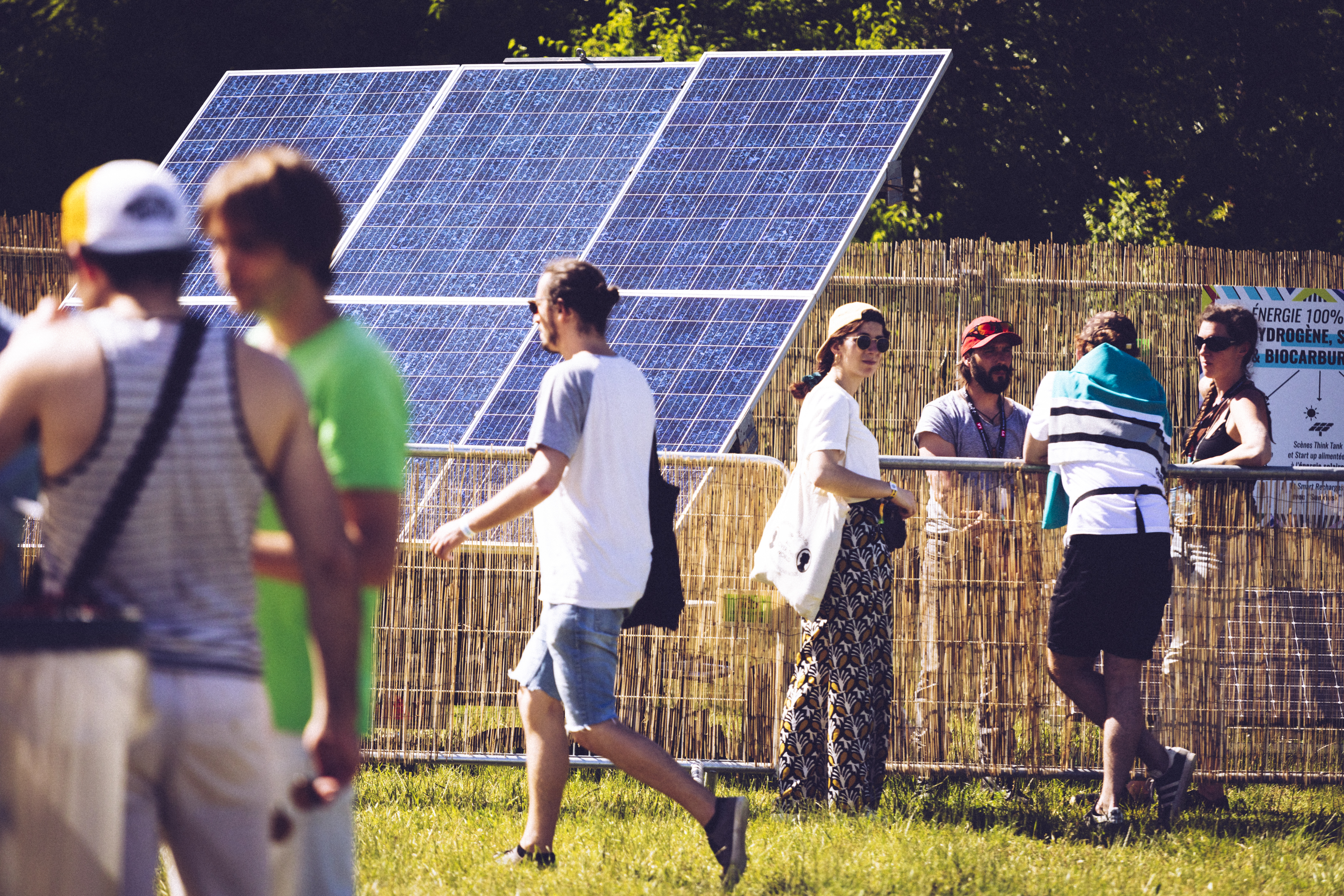
LIMITING AND CONTROLLING WATER CONSUMPTION
- Free drinking water in public areas and backstage thanks to 176 taps set up with Eau de Paris
- Dry toilets and sit/stand urinals throughout the festival (public and backstage areas): 250 cubicles in all
SUSTAINABLE FOOD
- A 100% vegetarian festival for everyone: festival-goers, artists and staff, totalling 113,000 meals in 2023! During set-up and dismantling, the catering will be vegetarian 1 day out of 2.
- Restaurants are selected through a call for applications, with a strict charter: seasonal, local, sustainably-farmed or organic produce.
- Verification of compliance with the charter by Ecotable
- Support from the festival teams: idea card for vegetarian recipes, training workshop, list of local producers and suppliers, etc.
- Sustainable drinks offer: of the 35 references in 2023, 17 were AB certified.
- To find out more about the programme and the commitments of the festival’s restaurateurs, go to the Food section.

TRANSPORT AND MOBILITY
In 2022, festival-related travel generated 851 tCO2e, or half of our carbon footprint.
FESTIVAL-GOERS
The mobility of festival-goers accounts for almost 80% of emissions linked to personal travel. Of this total :
- 60% were due to air travel, although 0.6% of festival-goers travelled by air.
- 35% were due to car journeys for 5.8% of festival-goers.
We do our utmost to encourage our audiences to use soft mobility:
- Locating the festival on a site with good public transport links (see Info page), and working on the programme so that the concerts finish before the last metro/train/bus stop.
- Large guarded bike park at the entrance to the festival
- In 2023, TGV Inoui and Intercités gift vouchers will be given away in competitions thanks to the partnership with SNCF Voyageurs.
ARTISTS
The mobility of artists accounts for almost 20% of emissions linked to personal travel. Two areas of work:
- Programming: discussions with our European partners to develop and implement coherent tour routings that limit travel and the associated CO2e emissions. Our technical department is working with productions to offer them technical solutions on site, and to encourage them to bring light kits.
- Organising artist travel: in 2023, vouchers made available by our partner SNCF Voyageurs enabled us to pay for artists to travel by train rather than by plane: this involved 20 people from 2 artistic crews, saving 2 tonnes of CO2e.
STAFF
- Provision of bicycles and light electric carts
FREIGHT
In 2022, transport emissions linked to the production of the festival (equipment hire, production of stands, etc.) generated 214 tCO2e, or 16% of our total carbon footprint. We are working on pooling the transport of service providers. For the 60 restaurateurs in our Food Court, for example, goods are transported by just 5 refrigerated lorries (instead of a potential 60).
RAISING AWARENESS AND CIVIC INVOLVEMENT
THINK TANK CONFERENCES
10 years after its creation in 2014, the WE LOVE GREEN Think Tank scene is here to stay, rooted in the very essence of WE LOVE GREEN and still pursuing the same ambition of enabling a better understanding of our changing world, deconstructing stereotypes and imagining alternatives to existing models.
The discussions alternate rhythms and formats to provide a forum for constructive renewal: round tables, conferences, live and recorded podcasts with iconoclastic thinkers, activists, agents of change and specialists in climate change.
Each year, activists and committed personalities present on the Think Tank are invited to speak out loud and clear about their commitments in front of thousands of people on the festival’s main stages, to raise awareness among a wide audience, including those who have come exclusively for the musical programme.
Upcoming Think Tank 2024 programme. To find out about the content of previous editions, go to the Think Tank page.
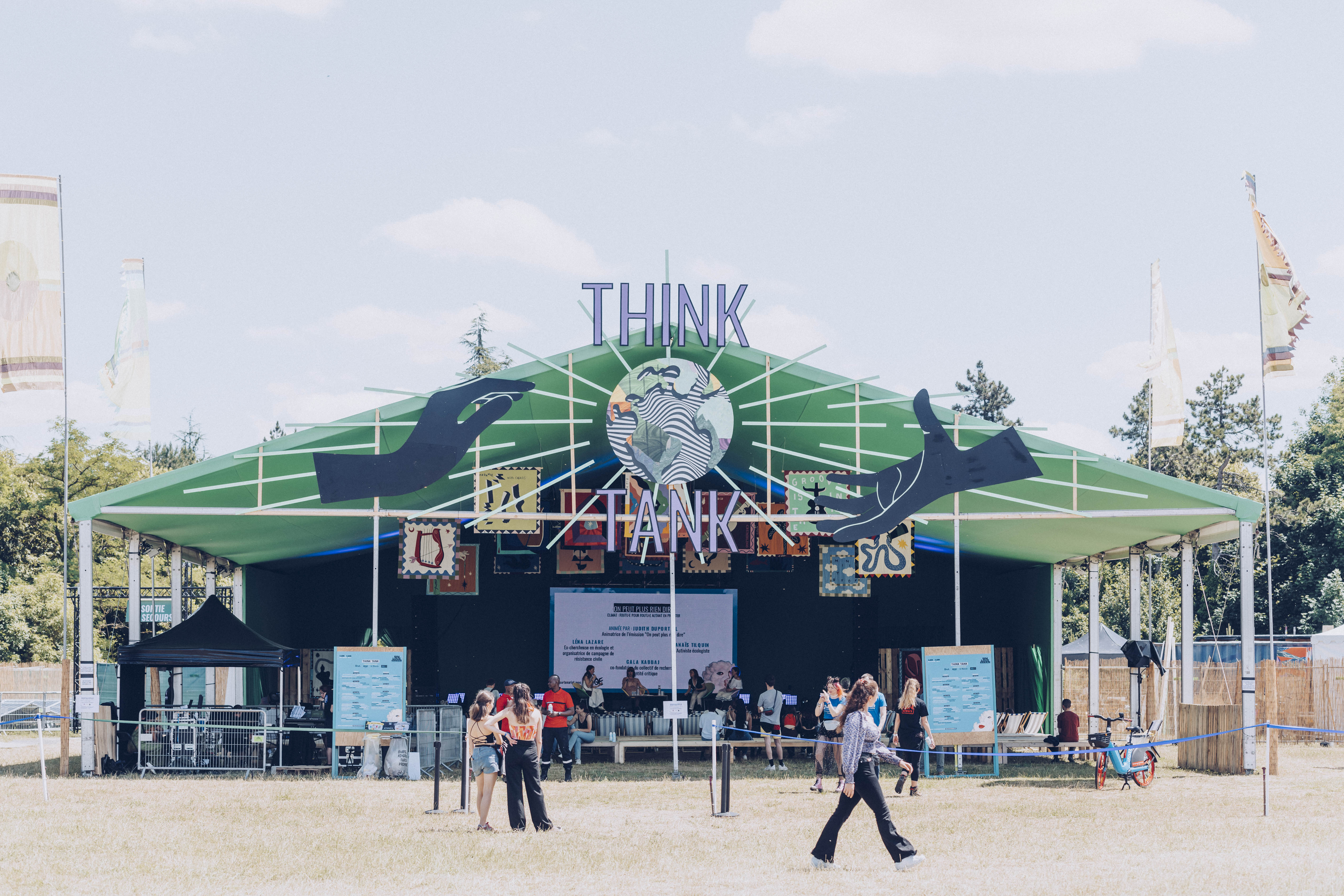
POSITIVE INITIATIVES VILLAGE
The Positive Initiatives Village is the place where the actors of change – committed associations and innovative companies – meet the festival public.
It’s an opportunity to discover sustainable innovations and, above all, meaningful professional sectors that are often little known to young people, and to meet members of committed NGOs who are there to raise awareness of their actions and give the public the chance to get involved alongside them.
The innovative companies are selected by a panel of SSE professionals following a call for applications.
In collaboration with MakeSense, WE LOVE GREEN also organises the annual Wall of Meaningful Jobs, giving festival-goers an opportunity to find out about jobs in these promising sectors.
The call for applications for the 2024 Positive Initiatives Village will be launched shortly.
THE DONATION SYSTEM
A system of donations from the festival’s ticket office and cashless is in place for associations with which WE LOVE GREEN has links. Since 2018, €38,703 has been collected and redistributed for them.
For 2024, if you can when you buy your ticket, we invite you to support projects working for biodiversity:
- Boomforest, a non-profit association that plants mini-forests in urban areas with the participation of local residents and stakeholders. It encourages the multiplication of these citizen plantations so that all those who wish to get started can do so on their own scale.
- SAUGE – La Société d’Agriculture Urbaine Généreuse et Engagée – wants everyone to garden for 2 hours a week to encourage the agro-ecological transition. To achieve this, SAUGE runs urban farms, produces organic plants and works in schools in Ile-de-France and Nantes!
RISK PREVENTION AND REDUCTION
Combating Sexual and Gender-Based Violence and Harassment (SGBV):
- The Safer system, consisting of an application for reporting any problematic behaviour or situation of violence, and a team of 55 trained volunteers on patrol.
- Signage dedicated to the fight against VHSS and discrimination displayed at strategic points throughout the festival.
- A protocol for reporting and dealing with victims and aggressors has been communicated to staff and teams in contact with the public.
- The presence of Family Planning at the Information/Prevention Point to raise awareness in a fun way.
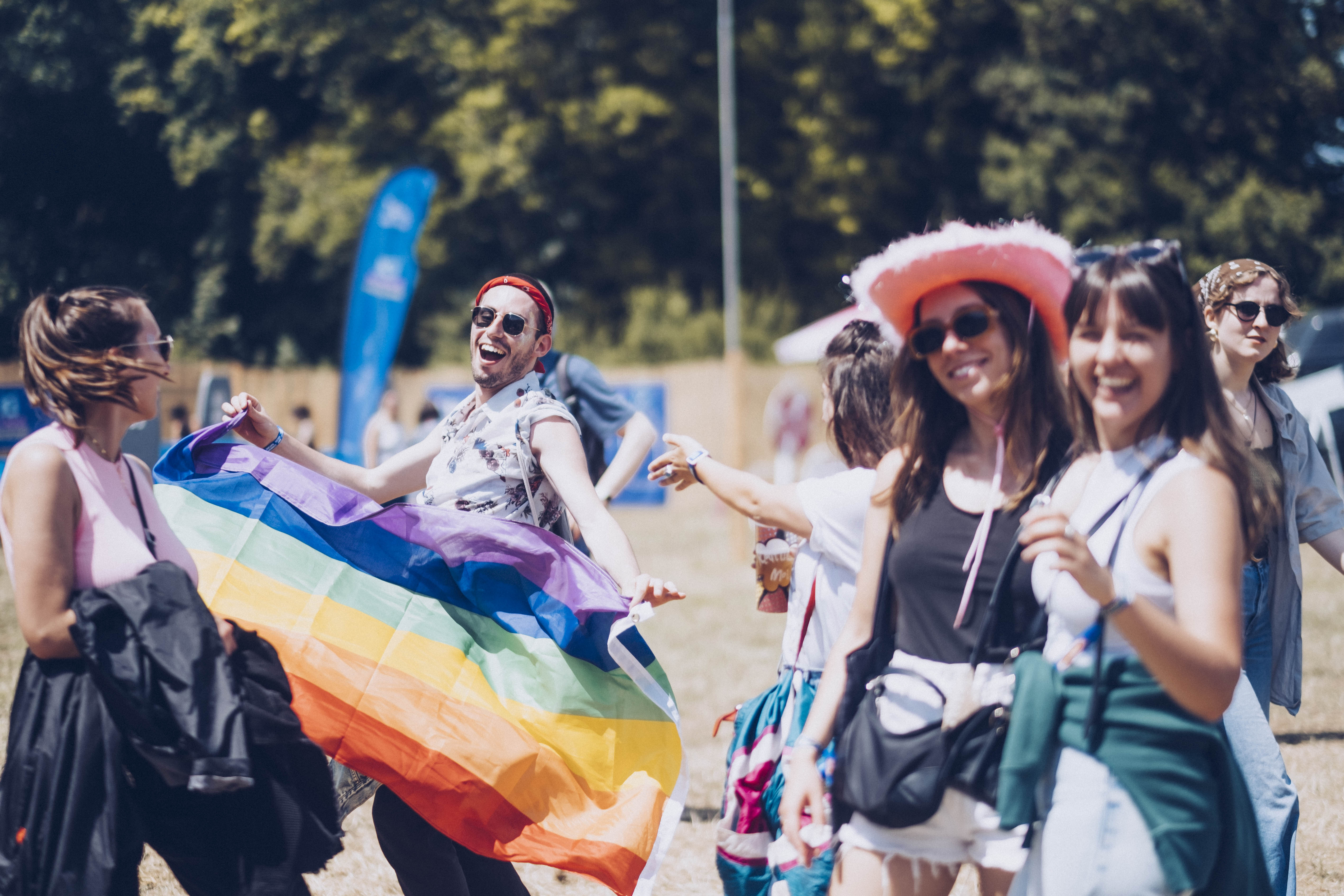
PREVENTION AND REDUCTION OF RISKY CONSUMPTION
Collaboration with associations specialising in the prevention of risky consumption to raise awareness, engage in dialogue and support the public:
- Fêtez Clairs, which aims to integrate health promotion, risk behaviour management and violence prevention into Parisian party culture.
- CRIPS Île-de-France, which works in the field of youth health and the fight against HIV. Workshops were held to raise awareness of the dangers of risky consumption and of sexist and sexual violence.
A roving team of “Désoiffeurs” (“Dis-headers”) was responsible for distributing free water to the public and raising awareness of the importance of staying hydrated.
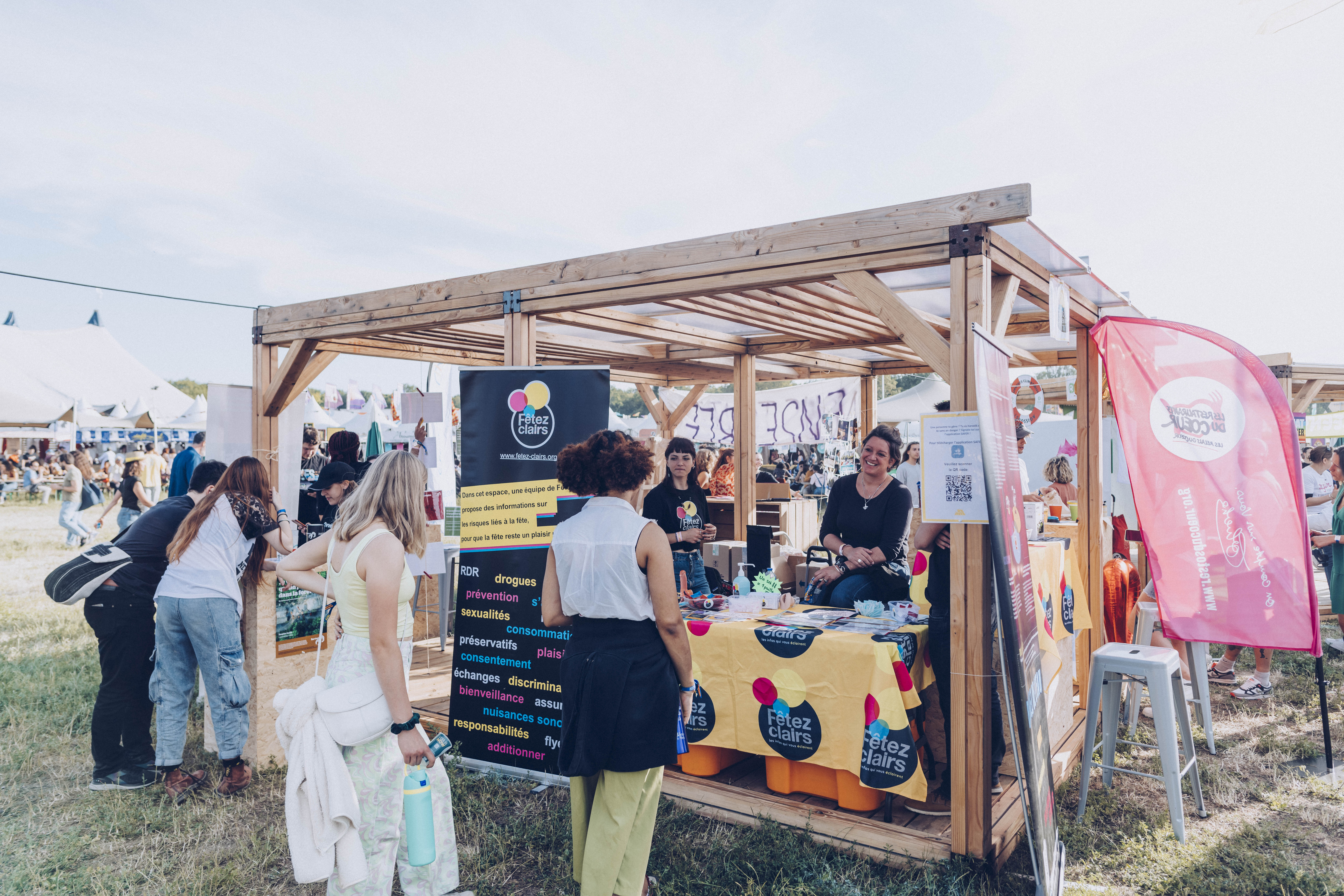
PREVENTION AND REDUCTION OF HEARING RISKS
- Free distribution of single-use earplugs (at the Information/Prevention Point, in the bars, and distributed by volunteers in front of the main stages) and sale of reusable earplugs and children’s helmets at the merchandising stand.
- In 2023, an area on hearing risks will be set up at the Prevention Point by the Thalie Santé association, which works in the field of prevention and occupational health in the cultural sector.
- Information signs on every stage and in the bars.
- WE LOVE GREEN is a member of the Board of Directors of Agi-Son and participates in the industry’s work on sound management, to reconcile the preservation of hearing health, respect for the environment and the conditions of musical practice.
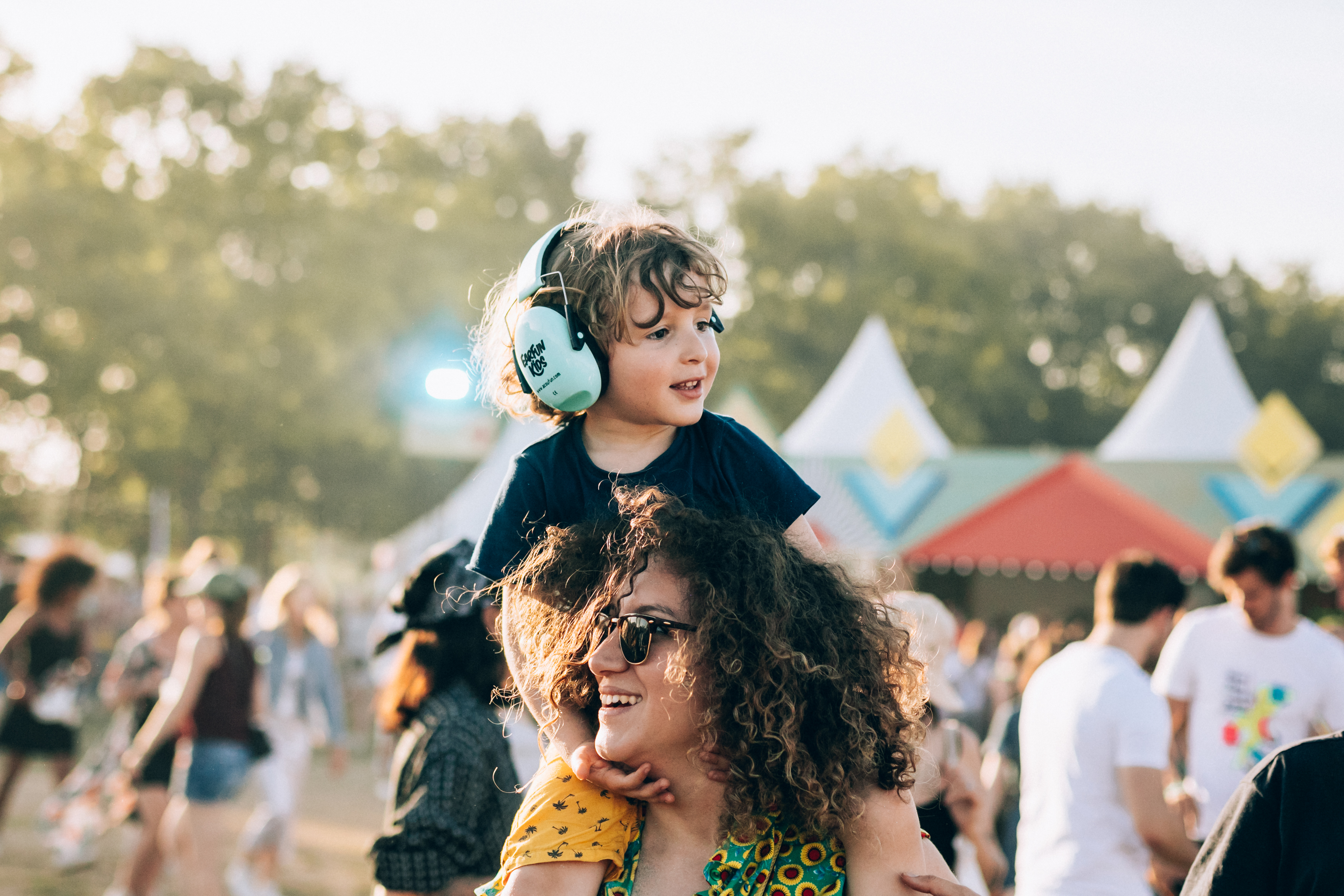
ACCESSIBILITY FOR PEOPLE WITH DISABILITIES
In 2023, the following measures were put in place to improve access to the festival for people with disabilities: reduced rate for people receiving the AAH, dedicated car park and entrance, lowered counters, adapted toilets, handi-accueil and a team of welcome and orientation volunteers supervised by the two specialist associations Inclusiv’Events and AMAAC, platforms in front of the 3 main stages (Prairie, Clairière, Canopée), magnetic loop (Prairie stage), vibrating waistcoats (Prairie and Clairière stages), universal accessibility path to facilitate movement in certain areas, wheelchair loans.
To find out more, visit the Practical Info page.
With the support of Malakoff Humanis.
In terms of services, the festival offers:
- Platforms set up in front of the main stages (Prairie, Clairière and Canopée) to facilitate access to the concerts for people with disabilities.
- A guide written in French that is easy to read and understand (FALC) listing practical information about the festival, as well as access and facilities for people with disabilities – Available HERE
- An electric buggy running between the PRM/PSH car park and the festival entrance to make it easier for disabled festival-goers to get to the festival.
- A magnetic loop installed on the festival’s main stage to enable hearing-impaired people equipped with a hearing aid to enjoy the concerts in the best possible listening conditions.
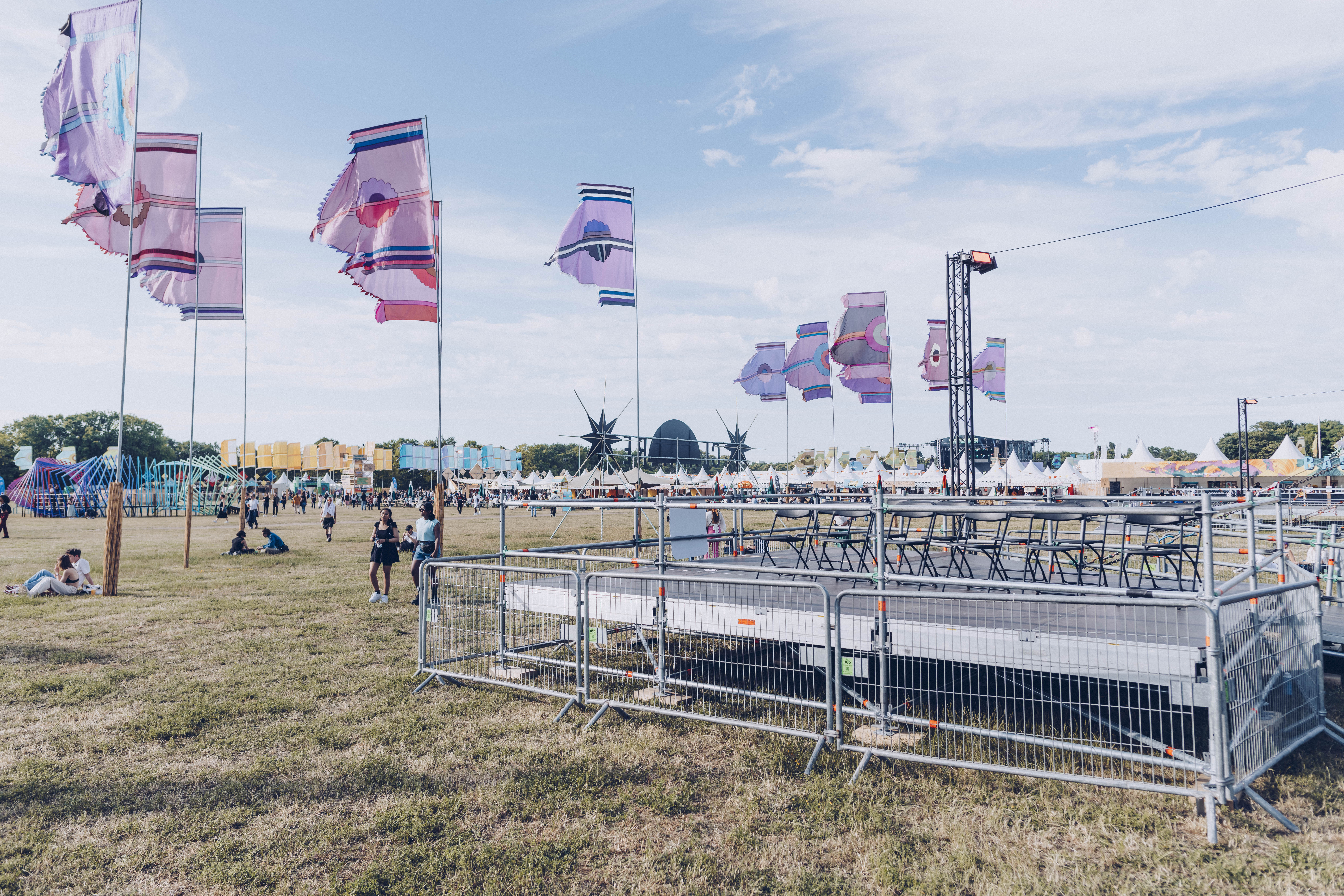
ASSESSMENTS & CERTIFICATION
CARBON ASSESSMENT
The carbon footprint is a way of counting the greenhouse gas (GHG) emissions generated by a company, a product or an individual. It is a tool for measuring our dependence on fossil fuels and for working to reduce it year on year.
Our 2023 carbon footprint is currently being finalised, and will be published here as soon as we have finished editing it.
In 2022, the festival generated 1685 tCO2e, or 16 kgCO2e per festival-goer, compared with an average of around 50 kg CO2e per festival-goer for events of the same size, according to the Shift Project. More concretely, this is equivalent to 396 years of gas heating for a 112 m2 house (source: ADEME). What weighs most: travel, food, freight and housing.
Drawing up a carbon footprint is a complex and imperfect process. On the one hand, it is complicated to collect all the data from all our stakeholders, even our service providers and partners. On the other hand, this necessarily leads to extrapolating the results obtained, which cannot guarantee a 100% accurate carbon footprint, as the representativeness of the initial data is not itself guaranteed.
For example, to take account of festival-goer transport, the results are based on the sample of people who responded to the festival-goer survey, i.e. 3% of the audience.
Our carbon footprint is a tool for measuring and analysing our impact. It helps us to refine our work on the independence of our event from fossil fuels and its sustainability.

ISO CERTIFICATION 20121
It’s long, it’s not funky, but embarking on a “responsible management system applied to the events business” certification is a way of ensuring that you’re on the right track for the years to come. All the WE LOVE GREEN teams are committed to this fundamental process.
AWARDS & CERTIFICATIONS
- CERTIFICATION “OUTSTANDING” PAR A GREENER FUTURE : 2011 – 2012 – 2014 – 2016 – 2017 – 2018 – 2019 – 2022
- HEAVENT FESTIVALS AWARDS : 2022
- TROPHÉE ÉVÉNEMENTS PARISIEN ÉCO-RESPONSABLES 2018
- YOUROPE : Green & Clean Award 2012
- EUROPEAN FESTIVAL AWARDS : Green Operations Award 2012

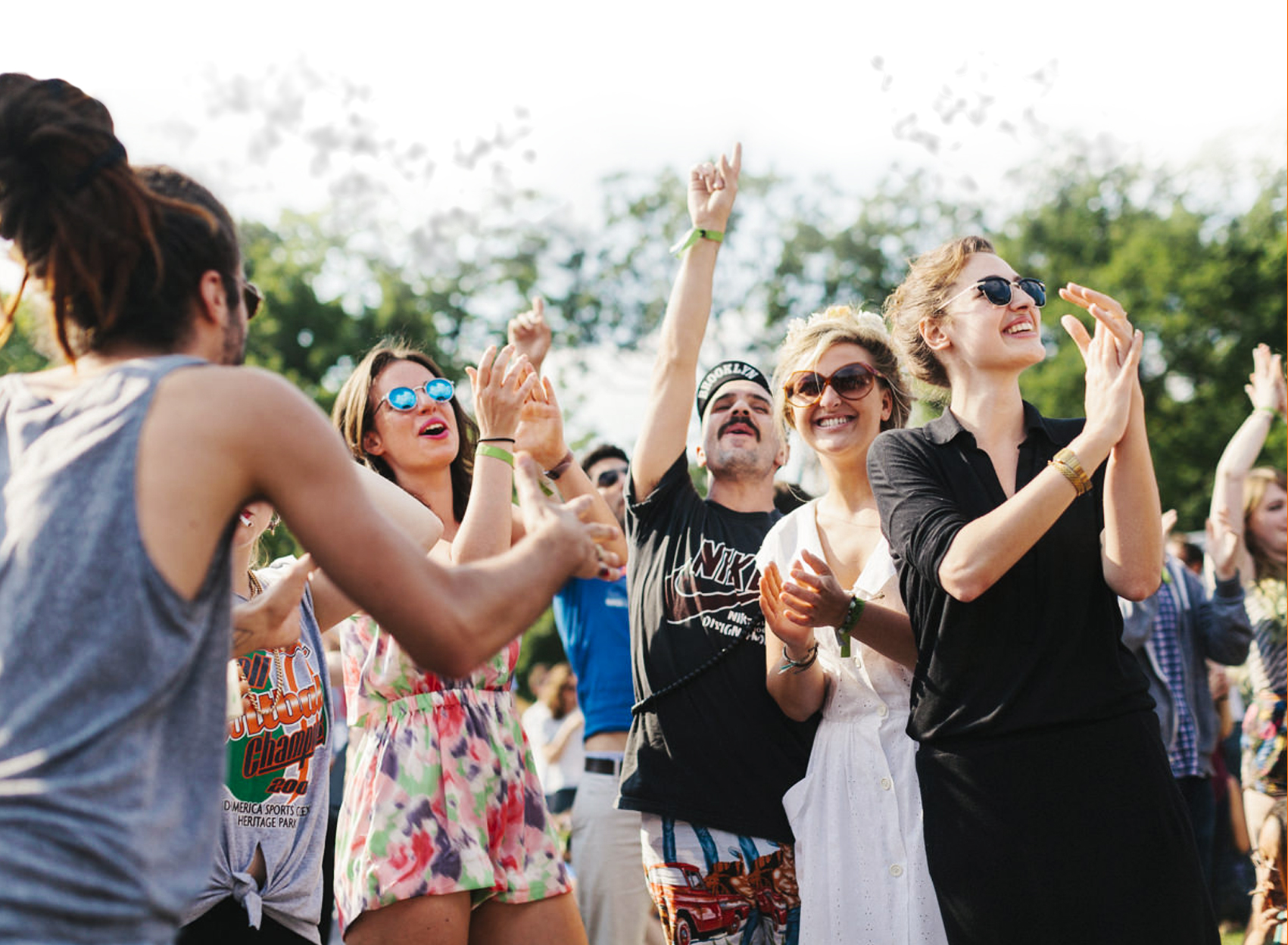
Facebook
Twitter
Instagram
Youtube
Newsletter